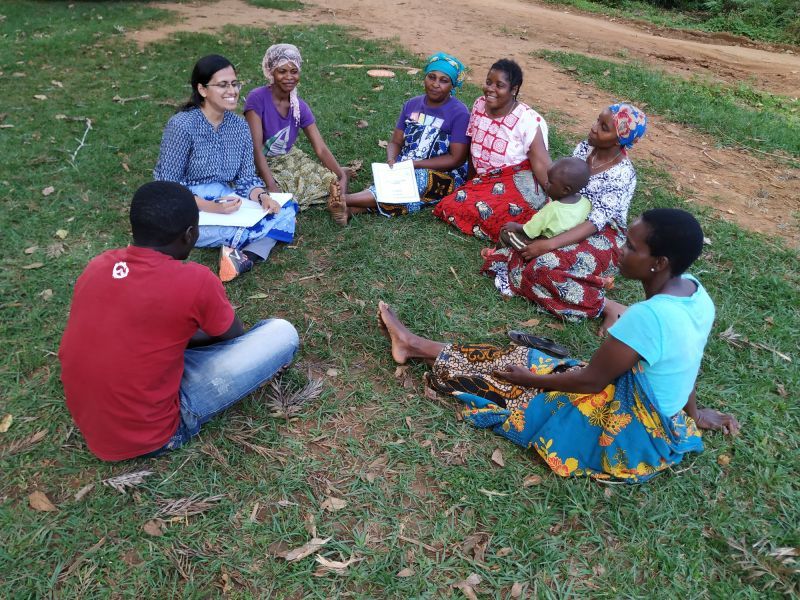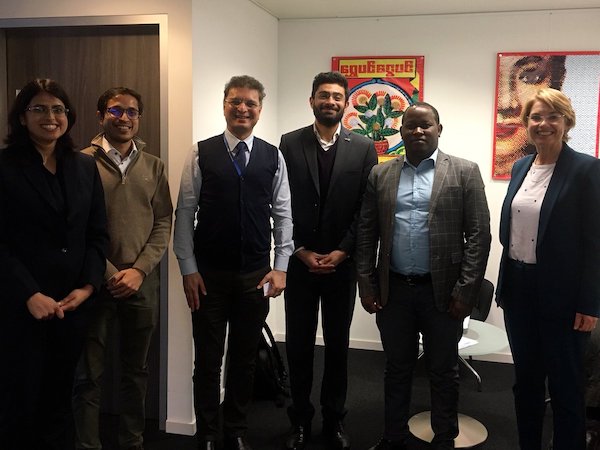
Over the past 12 months the ICA has been working with the International Trade Centre (ITC) in Geneva to explore the potential for future collaboration. This culminated with the ITC’s participation in the online event "The Coop way: how cooperatives practice, protect and promote human rights in value chains" organised by the ICA’s International Cooperative Entrepreneurship Think Tank on 10 December to celebrate UN Human Rights Day. Read our report here.
The International Trade Centre (ITC) is the joint agency of the World Trade Organization and the United Nations. Santosh Kumar, ICA Legislation Coordinator, talked to Anne Chappaz, Chief of the Institutional Strengthening Section of the ITC, and her colleagues Aman Goel, Institutional Development Expert, and Niti Deoliya, International Consultant and Annegret Brauss, Associate Programme Management Officer, about their work and the role of cooperation in trade.
As this interview will be launched around the 2020 UN Human Rights Day, we would like to know if you see a role for cooperatives in tackling human rights abuses and promoting transparency in supply chains, and why?
Annegret: Cooperatives have a key role to play in safeguarding human rights and promoting transparency in supply chains. Since cooperatives often have a dual function – one of a business support organisations, as well as the one of a business – their potential impact in this regard can be even more pronounced. Cooperatives are well-placed to bridge the interests of different stakeholders along international value chains, from the producer to the international buyer level and through this can trigger change at various levels. In addition, by ensuring good practices, such as in relation to labour rights protection, gender equity and youth empowerment, they can act as role models themselves.
What does the ITC do?
Anne: The ITC was established in 1964 in Geneva, Switzerland. It is a joint agency of the United Nations (UN) and the World Trade Organization (WTO). It enables MSMEs in the developing and transitioning economies to become more competitive and connect to international markets for trade and investment. It focuses on fostering the policy environment and supporting ecosystems to help MSMEs become competitive in global value chains. It has been contributing to all the SDGs, with a particular focus on SDG 8, Decent Work and Economic Growth.
Do you perceive cooperatives as important actors in trade and business?
Niti: The ITC sees cooperatives as a hybrid between an institution and a business. As cooperatives are resilient in crisis situations, they are reliable partners. Furthermore, cooperatives help to achieve the required scale and numbers through their large membership. They allow traceability and accountability to the buyers/exporters we work with. Cooperatives can also help diversify the supply chain and, as enterprises driven by concerns for their members, they contribute to the SDGs.
How is the ITC’s Institutional Strengthening Unit working with cooperatives?
Anne: My team’s expertise is in building the core capability of key institutions within the trade and investment ecosystem so they are able to better address the needs of their clients. That spans from developing the strategy of the organisation to monitoring and measuring their performance. We have supported over 500 institutions in over 50 countries in the last decade to become strong multipliers of ITC’s assistance programmes. We have expanded this offering to cooperatives in the last five years as we see cooperatives not just as business but also as institutions that provide services to their members. Therefore, many of the concepts of institutional capacity building hold true for cooperatives as well. The feedback from our partners, including projects, donors as well as the cooperatives themselves has been very encouraging.
Aman: To give a specific example, we are working with exporters of spices and the Spices Association in Tanzania. For exporters, working with cooperatives ensured them a reliable supply of produce, and they could reach out to a larger number of producers systematically. For the Spices Association, working with cooperatives (as the association’s members) has been helpful in delivering training and managing members efficiently.
Anne: The purpose of the collaboration is to come up with a joint approach to build institutional capacity of farmer cooperatives to enhance their trade potential. The focus area for the initiative would be the Muheza district of Tanzania.
Anne & Niti: Cooperatives could provide a viable solution for farmers, enabling them to work together, share risks and increase their negotiating power. As the cooperative model is resilient to external shocks, we believe they could be crucial in withstanding socio-economic crises and would continue to provide opportunities for addressing increasing poverty and socio-economic inequality.

How did your collaboration with the ICA begin?
Anne: Our team got in touch with the ICA in 2019 through our participation at its Global Conference in Kigali, Rwanda. Since then, we have been in dialogue with each other and have been exploring ways to collaborate and jointly work with cooperatives.
For us, cooperatives are important and the model resonates well with ITC’s objectives. Coops help us achieve required scale and numbers through their large membership; allow us to achieve value for money for our projects; provide insights into project design and a closer link for measuring our impact; and have an immense potential to create a multiplier effect and SDG impact by providing sustainable livelihood and associated benefits (education, health, gender mainstreaming, etc.) to the community. As we face the additional challenges of a pandemic, growing global inequality, and climate risk, the tried and tested principles and values of the coop movement resonate with ITC, our partners and our beneficiaries.
What sort of support and technical assistance is available for cooperatives from your end?
Niti & Anne: The ITC can provide technical assistance in the following ways:
· Awareness raising: Targeted cooperatives could be assessed using ITC’s cooperative assessment tool. The findings could be presented to cooperative leaders and tailored capacity-building plans could be developed.
· Capacity building: Cooperatives could be supported through a package of capacity-building interventions. Interventions strengthening business include training on packaging, branding, and access to finance, among others. On the institutional side, cooperatives will be capacitated on improving their leadership, governance, communication with members, etc. These interventions will be delivered through a mix of group workshops and personalized coaching sessions.
· Knowledge transfer: We can help leverage partnerships with large, successful cooperatives globally to bring best practices on managing cooperatives.
· Ecosystem Strengthening: We could assist in enabling a suitable institutional ecosystem for cooperatives. We could identify relevant institutions, map their service offering, and improve performance of the institutions working with cooperatives.
· Market linkages: We could leverage partnerships with other cooperatives and global businesses to facilitate direct business linkages with the beneficiary cooperatives.
· Inclusion: A significant number of cooperatives are managed by women exclusively. We may lay emphasis on working and improving capacity of such cooperatives - which could also benefit from the ITC’s SheTrades initiative.
How does the ITC’s assessment tool for primary cooperatives work? And how do you think our collaboration would be useful on this front?
Niti: The assessment tool is a maturity-based model. It assesses performance of the cooperative over 86 indicators, identifies strengths and limitations and helps prioritise areas for action. Assessment results lead to goals and plans for improvement. We have assessed 30 cooperatives in six countries since 2019 and we received good feedback from members.
The results are shared in an assessment report, which has scores for the cooperative. It is granular, compares results with best practices for aspiration and it has easy to understand graphs. It provides a concise summary of strengths, limitations, and areas of improvements for the co-op and recommendations through a formulated work-plan for the cooperative.
How do you see the role of primary and secondary cooperatives in international trade?
Aman: As the pandemic has threatened the supply chains, a stronger need is felt globally to create channels, and scale up investments to develop a stronger network through which farmers could access markets. We believe if cooperatives at the primary and secondary levels collaborate, they could be key players in promoting rural entrepreneurship, business development, employment creation and women empowerment.
ITC and ICA could collaborate to develop the partnership between cooperatives at the primary and the secondary levels to facilitate coop-to-coop trade.
The ICA will organise its 33rd World Cooperative Congress in 2021. What are your reflections on the theme - “Deepening Our Cooperative Identity” and how would you like to contribute to this event?
Anne: We congratulate the ICA for its 33rd World Cooperative Congress. The theme of the event resonates with our work. According to us, the elements of cooperative identity i.e. the cooperative principles and values, are foundational to cooperative’s existence as well as its success. We have a strong focus to ensure that the cooperatives we work with are able to endorse cooperative identity into their operations.
ITC will be happy to contribute to the Congress. We could possibly focus on the following key areas:
· Understanding cooperative as a hybrid of an institution and a business enterprise
· Best practices to strengthen institutional side of cooperatives
· How coop-to-coop trade could be developed to build resilient trade linkages?
· How cooperatives could work with youth and women cooperatives?




